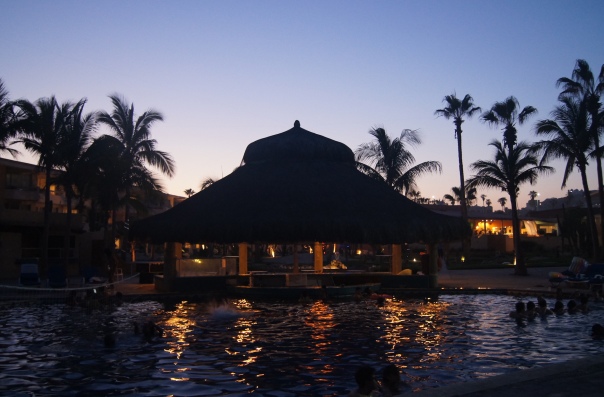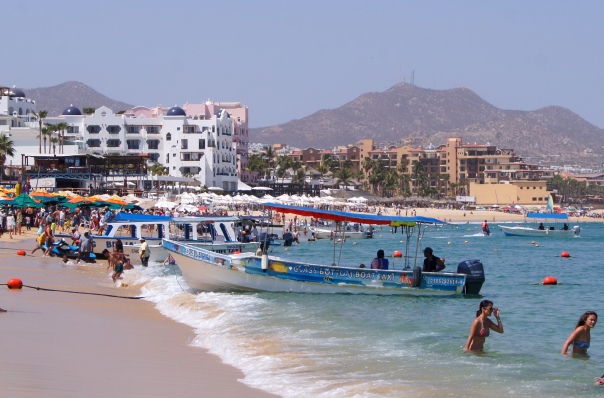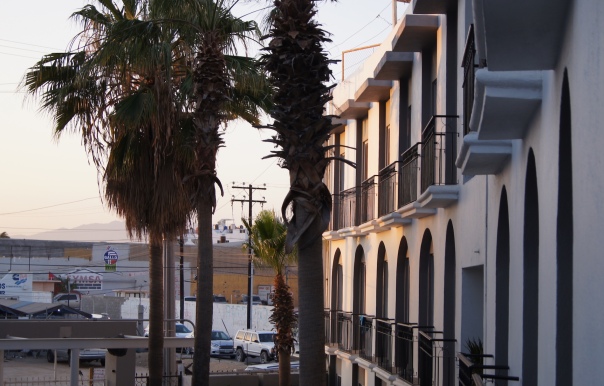In the long, convoluted history of human progress, there has never been a better time to get a hotel room.
You don’t need to see a travel agent nor carry around a guidebook that’s heavier than a pair of hiking boots. All you need is an internet connection, a little patience, and some travel-planning tactics.
In Mexico, as with anywhere, you basically have two ways to find accommodation, whether it’s a fancy resort, a spacious apartment, a hip guesthouse, a no-frills central hotel, a dirt-cheap hostel, or a space to put up a tent next to the beach.
I like both options, and whether I use one or the other mostly depends where I’m going. I usually book online if I’m taking a short trip to only one place, if I know exactly where I want to stay, if I’m traveling at a busy time, or if I’m going to a country that I’ve never visited before and don’t know much about.
When I’m going on a longer trip with several destinations, however, I prefer to find hotels by wandering around and checking them out in person. This is easy in most parts of Mexico, where you can find concentrations of hotels in the center or town or around tourist areas, like the beach. You can save a lot of money this way too.
Or, especially if my flight arrives after dark, I may reserve a hotel online for only the first night or two, and then for the rest of the trip I’ll find hotels on foot whenever I arrive in a new part of the country. This is the best plan for a long backpacking trip—without hotel reservations every day, you can stay longer in places you like and leave the places you don’t.
Below I’ll explain both methods and my strategies for using them. But first…
Regarding package tours
If your idea of a vacation is buying a package that includes the flight, hotel, meals, transportation, and a guide who will accompany you the whole time, then you don’t really need this article. I don’t want to sound like a travel snob who’s sneering at the folks on the tour bus, but I must say that I strongly dislike that style of travel.
Besides the obvious—no freedom to do what you want, no opportunity for unplanned adventures—the main drawback to a package tour is all the waiting: getting on and off the bus, checking into multiple hotels, packing and repacking and packing yet again, and the inevitable lateness of your fellow tourists. Also, when you do the math, it’s usually cheaper to plan everything yourself.
I will say, however, that if you want a package tour to avoid the hassle of researching, navigating and negotiating—if you want that tour guide explaining and translating everything for you, every step of the way—then go for it. Search online and talk to travel agents.
But if you think you’re going to save money, at least compare with the cost of hotels (with the methods from this article) and
flights you find online before you commit to the tour. Don’t assume that all-inclusive packages are automatically cheaper, especially because of the current low cost of flights and the abundance of hotels in countries that get a lot of tourists, like Mexico.
1. Booking online
Even if you plan to find hotels by walking around, it’s still a good idea to take a look online first. You can identify which parts of the city have the most options and get an idea of prices.
Google Maps is a good place to start. Type in the name of the city and “hotels” in the search field, for example, “Cancun hotels.” Then the map will zoom in and you’ll see the hotel icons, some with prices.
Google Maps is not a booking site, but it gives price estimates from other booking sites. After you click on the little icon for a hotel, you can put in the dates of your trip and see prices from various websites.
Usually these prices are all similar, but obviously try clicking on the cheapest one. This may be the part of the process you find frustrating, especially if it’s a travel site you’ve never used before. Some don’t include taxes and fees until the very end, when the price may go up by a lot.
While having this price comparison is a clear benefit, the best thing about Google Maps is—surprise—the map. You can see where the hotel is located, which in my opinion is the most important feature of any accommodation.
So it’s a good idea to do a little research into where you’re traveling. In Cancun, for example, when I type “Cancun hotels” into the search field, only the big, expensive hotels in the hotel zone come up. The
discount hotels in Cancun, however, are downtown, but when you zoom in on downtown Cancun, no hotels are shown. You have to type in “Cancun hotels downtown” to see all of these cheaper options.
Having an idea of geography is even more necessary for an enormous metropolis like Mexico City. Simply typing in “Mexico City hotels” will give you options all over the place, but you’ll get better alternatives if you choose a specific neighborhood.
In most cities in Mexico, search around the zocalo, or center square, which is not only the center of town surrounded by historic buildings and places of interest for travelers, but usually has plenty of hotels nearby.
Travel booking websites
Like I wrote above, Google Maps is a good place to start, but by no means does it give you a comprehensive listing of hotels. Because it’s not a travel booking site, many hotels will not appear on searches, especially the cheapest. (Actually, the cheapest hotels in Mexico won’t be listed anywhere—the best way to find them is on foot.)
So, unless you find exactly what you’re looking for on Google Maps, also take a look on travel booking websites. I recommend
booking.com, although there are countless other options, including
expedia.com and
tripadvisor.com, two popular ones.
Same as for Google Maps, always have an idea of where you want to stay first. Look at the map and see if the hotel is within walking distance of places you want to visit.
Next, read the reviews, good and bad. You can ignore one bad review, but if many reviews mention the same problem, then you can believe them.
Before you pay you’ll see a page that shows all the different room options. Look at this page carefully, especially for:
- Is breakfast included?
- Is there free parking? (Only if you need it, of course.)
- Is there free wi-fi (some hotels charge now), air-conditioning, a pool? Whatever else you require from a hotel?
- What is the cancellation policy?
This last one is crucial. Many hotels offer free cancellation until the day before you arrive. This is important not only in case your plans unexpectedly change, but also, if you have the time, you can do another quick search for hotels a day or two before your trip to see if something better is available. There may be a big, last-minute discount for a nicer hotel. If so, cancel the first hotel you booked and then book the new one. At least on
booking.com and expedia, the refund is instantaneous.
Sometimes you can choose whether you pay online or pay at the hotel. If the price is the same, then it really doesn’t matter what you choose, although paying online saves you an extra step when checking in.
You’ll notice that on many sites, certain hotels have notices like “Hurry up! Only 2 rooms left!” Well, as cynical as I am about all things online, I must say that these announcements are probably true. I’ve observed several times that, when I check back later, the hotel that had the notice is no longer available. So, when you see a decent hotel that you’re not 100% sure about, review the cancellation policy carefully. If it has free cancellation until the day before you arrive, then you can book it without worry.
In general, with reserving both hotels and
flights online, when I see something I know is good, I just book it and don’t think about it again. But if you’re not sure, then search several booking sites. Certain hotels will be listed on one site but not the others, and sometimes the prices or the options (breakfast, cancellation policy) are different on different sites.
Whichever site you use, sign up for an account so you can collect points and get access to special discounts. This is optional, however; most sites let you book without having an account.
Other online options
I must also mention
airbnb.com, which is quickly becoming more common in Mexico. With airbnb, you look at rental properties like apartments or even whole houses. It’s great for larger groups or if you want a kitchen. You can search airbnb without an account, and the process is similar to other travel sites, except that when you finally make the booking, the owner of the property has to approve you too. So you always need to make an account when you finally want to book a place.
Another option is
couchsurfing.com, which I’ve never used and never will. Lots of travelers swear by it, but I’ve heard too many horror stories (creeps creeping into the bedroom at night, creeps insisting on going out drinking together…and worse). Besides, I like privacy and don’t want to be some stranger’s houseguest while I’m traveling. Plus, if you’re on a budget, it’s not hard to find really cheap hotels in Mexico.
There are also many websites specifically for booking hostels. I’ll discuss hostels below, but right here let me mention two things. First of all, dorm beds in many hostels in Mexico, especially those that are popular on booking websites and listed in Lonely Planet, are actually more expensive than a private hotel room. Second, many hostels are not very clean and borderline unsafe. If you want to do the hostel thing, you are much better off visiting it in person.
Regarding resorts
As you search on
booking.com and the others, you’ll see many options for resorts. In fact, for many people, a resort will be their Mexican vacation. They typically include all your meals and drinks, have excellent locations, and have big swimming pools and other fun amenities.
Sure, there are lots of advantages to staying in a resort. If you don’t have the time for a longer trip and just want to relax, then go for it.
There are some downsides, however. Staying in a resort means you’ll be missing out on culture, including authentic Mexican food, which typically isn’t served at resorts that have a lot of international guests. Also, although discounts abound, I’m not sure that resorts are always cheaper than the combined costs of modest (but nice) hotels and eating in restaurants, especially because eating good local food is typically inexpensive as well.
2. Walking around looking at hotels
Some of the cheapest places in Mexico are not on Google Maps or in Lonely Planet or other guidebooks. The only way to find them is to walk around.
This is a good option if you don’t mind wandering around unfamiliar places and possibly getting lost, and it’s an even better option if you’re patient, like to walk, can speak a little Spanish, and are on a budget.
Do not use this method after dark—it’s just not safe. Always get an idea whether the area you plan on walking around is safe or not, but you should know that tourist areas in most parts of Mexico (by the beach, around the zocalo) are perfectly safe in the daytime. It’s a good idea to do a quick check of Google Maps beforehand to get an idea of possible routes and what to expect for prices.
In general, in most Mexican cities, you have two options for areas to explore when looking for hotels: near the bus station or around the zocalo.
In general, getting a hotel near the bus station is not a good idea. While these may be the cheapest in town, they may be unacceptably run down or dirty. Also, bus stations in Mexico are often not in the center of town, so there’s nothing to do or see nearby. But if you just need to find a quick place to crash without spending a lot of money or walking too much, then something cheap is bound to be available near the bus station.
The zocalo, or center square, is the best area to look around in most Mexican cities. The hotels right on the zocalo are usually a little fancier and more expensive, so explore the adjacent streets for further options.
Of course, when going to a beach town, you probably won’t want to stay near the zocalo, but on the beach. To save money, look for small hotels a block or two away.
The strategy
Simple, family-run hotels may have the prices posted behind the front desk, but if not, you’ll have to ask. If you don’t speak Spanish, have a pen and paper ready for them to write the numbers on.
If you’ll stay for a week or more, try asking for a discount. If they have a kitchen, get them to confirm that you can use it without paying more.
Always ask to see the room before you take it. In all my travels all over Mexico, even when I could barely speak Spanish, I’ve never met anyone who refused to do this.
Examine the bed—too hard, too soft? Peek in the bathroom—moldy, smelly? Try the shower—is there actually hot water? Turn on the fan or air conditioning—is it ridiculously loud?
Some more tips:
Ask if there are bugs in the room. They will always say “no,” but if you see one later, you can probably get your money back because they lied to you and know it.
Never stay in a hotel above a restaurant. You can be sure of cockroaches that way.
Also—and this may be a tough one—try to figure out if there is a popular bar or nightclub nearby. Many times I’ve been surprised by neighborhoods that seemed peaceful but get really loud after dark. You can try asking at the front desk, but if you’re worried, only book the first night.
Among other packing essentials, it’s a good idea to travel with earplugs, not only for noisy hotel rooms but also for noisy buses. Buy them at a pharmacy before your trip—earplugs can be hard to find in Mexico.
Discount hotels in Mexico may not offer towels, soap or shampoo, so pack a small quick-dry towel and whatever else you need. This is almost always true for hostels too.
Regarding guidebooks and hostels
I believe that the Lonely Planet model of a guidebook is outdated, especially the listings of hotels and restaurants. By “Lonely Planet model,” I mean the huge guidebooks with an entry for nearly every city and town in the country, which contains lists upon lists of hotels, restaurants, bars, places of interest, etc.
These guidebooks were certainly useful in the ‘90s and early ‘00s before the ubiquitousness of the internet. Back then I carried well-worn Lonely Planets in several parts of the world, and they were invaluable for getting information for out-of-the-way places. Honestly, they can still be useful for making plans at the last minute, like getting off the bus in a new town, particularly when you don’t speak Spanish.
But with a little planning before your trip, you don’t need the big bulky guidebook, for several reasons.
First of all, when a hotel or hostel gets listed in Lonely Planet or a similar guidebook, it instantly becomes more popular. At least for Mexico, you’re better off finding hotels on your own by walking around the right neighborhood or looking at travel booking sites. In Mexico, a private room in a small hotel is almost always cheaper than a bunk bed in a hostel dorm.
Sure, stay in the hostel if you want to make friends, but if you’re truly on a budget, you’ll save money by avoiding the Lonely Planet listings. Besides, if you’re actually looking for adventure, why stay where all the other backpackers stay?
This is also true for restaurants and nightclubs. The ones in the Lonely Planet may be full of foreigners getting overcharged, while a more local experience can be found by asking the right people a few questions. (Where do people go out dancing around here?)
By staying in small, family-run hotels, I’ve not only saved a lot of money, but I’ve met some interesting people too. I made friends with the owner of a hostel in
San Cristobal de las Casas, and now I stay there every time I visit, welcomed like an old friend. The owner of a hotel in Guatemala invited me into her home next door, which was full of odd statuettes and art, each piece with a story. And there’s no better person to get travel advice from than the friendly local working at the front desk.
If you have any more tips for finding hotels in Mexico or elsewhere, please share them in the comments.






